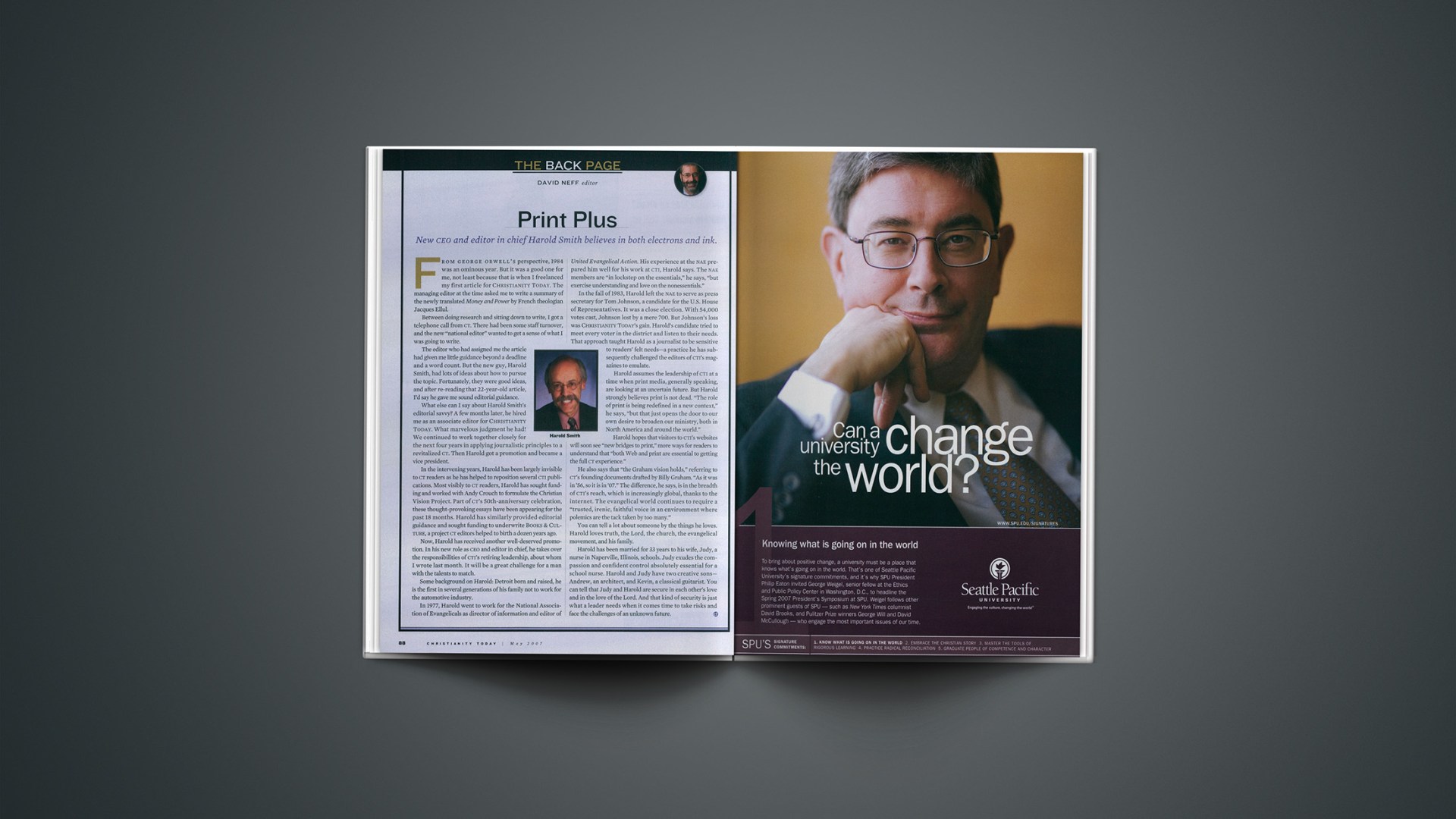From George Orwell’s perspective, 1984 was an ominous year. But it was a good one for me, not least because that is when I freelanced my first article for Christianity Today. The managing editor at the time asked me to write a summary of the newly translated Money and Power by French theologian Jacques Ellul.
Between doing research and sitting down to write, I got a telephone call from CT. There had been some staff turnover, and the new “national editor” wanted to get a sense of what I was going to write.
The editor who had assigned me the article had given me little guidance beyond a deadline and a word count. But the new guy, Harold Smith, had lots of ideas about how to pursue the topic. Fortunately, they were good ideas, and after re-reading that 22-year-old article, I’d say he gave me sound editorial guidance.
What else can I say about Harold Smith’s editorial savvy? A few months later, he hired me as an associate editor for Christianity Today. What marvelous judgment he had! We continued to work together closely for the next four years in applying journalistic principles to a revitalized CT. Then Harold got a promotion and became a vice president.
In the intervening years, Harold has been largely invisible to CT readers as he has helped to reposition several CTI publications. Most visibly to CT readers, Harold has sought funding and worked with Andy Crouch to formulate the Christian Vision Project. Part of CT’s 50th-anniversary celebration, these thought-provoking essays have been appearing for the past 18 months. Harold has similarly provided editorial guidance and sought funding to underwrite Books & Culture, a project CT editors helped to birth a dozen years ago.
Now, Harold has received another well-deserved promotion. In his new role as CEO and editor in chief, he takes over the responsibilities of CTI’s retiring leadership, about whom I wrote last month. It will be a great challenge for a man with the talents to match.
Some background on Harold: Detroit born and raised, he is the first in several generations of his family not to work for the automotive industry.
In 1977, Harold went to work for the National Association of Evangelicals as director of information and editor of United Evangelical Action. His experience at the NAE prepared him well for his work at CTI, Harold says. The NAE members are “in lockstep on the essentials,” he says, “but exercise understanding and love on the nonessentials.”
In the fall of 1983, Harold left the NAE to serve as press secretary for Tom Johnson, a candidate for the U.S. House of Representatives. It was a close election. With 54,000 votes cast, Johnson lost by a mere 700. But Johnson’s loss was Christianity Today‘s gain. Harold’s candidate tried to meet every voter in the district and listen to their needs. That approach taught Harold as a journalist to be sensitive to readers’ felt needs—a practice he has subsequently challenged the editors of CTI’s magazines to emulate.
Harold assumes the leadership of CTI at a time when print media, generally speaking, are looking at an uncertain future. But Harold strongly believes print is not dead. “The role of print is being redefined in a new context,” he says, “but that just opens the door to our own desire to broaden our ministry, both in North America and around the world.”
Harold hopes that visitors to CTI’s websites will soon see “new bridges to print,” more ways for readers to understand that “both Web and print are essential to getting the full CT experience.”
He also says that “the Graham vision holds,” referring to CT’s founding documents drafted by Billy Graham. “As it was in ’56, so it is in ’07.” The difference, he says, is in the breadth of CTI’s reach, which is increasingly global, thanks to the internet. The evangelical world continues to require a “trusted, irenic, faithful voice in an environment where polemics are the tack taken by too many.”
You can tell a lot about someone by the things he loves. Harold loves truth, the Lord, the church, the evangelical movement, and his family.
Harold has been married for 33 years to his wife, Judy, a nurse in Naperville, Illinois, schools. Judy exudes the compassion and confident control absolutely essential for a school nurse. Harold and Judy have two creative sons—Andrew, an architect, and Kevin, a classical guitarist. You can tell that Judy and Harold are secure in each other’s love and in the love of the Lord. And that kind of security is just what a leader needs when it comes time to take risks and face the challenges of an unknown future.









